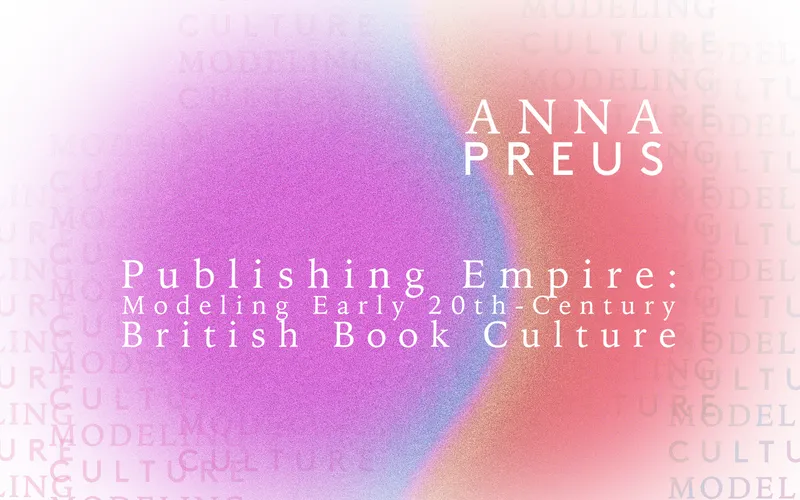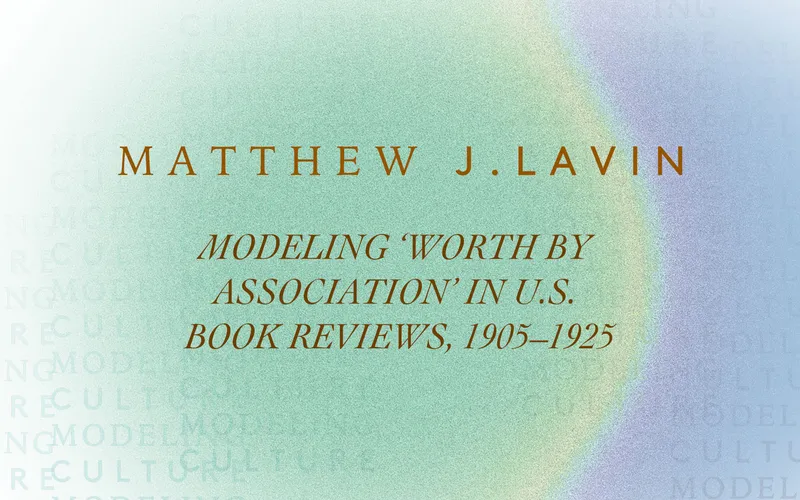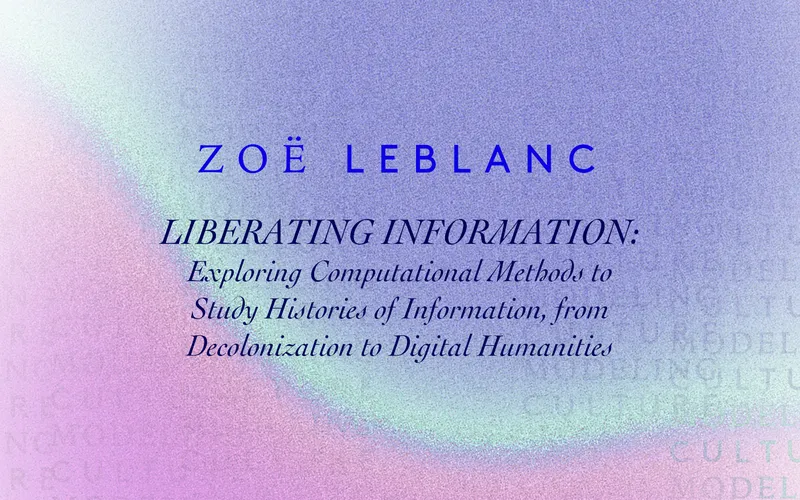CDH Launches Modeling Culture: New Humanities Practices in the Age of AI
8 September 2025

This fall, the Center for Digital Humanities (CDH) continues its focus on "Humanities for AI" with the launch of a new project called Modeling Culture: New Humanities Practices in the Age of AI. While research and debate about artificial intelligence rapidly evolve, Modeling Culture turns attention toward what the humanities uniquely offer. It explores AI not only as a technology to critique, but as a new mode of inquiry for research and interpretation.
"AI is transforming how we teach, learn, and imagine knowledge," says Meredith Martin, CDH Faculty Director and Principal Investigator. "But humanists bring essential perspectives. Beyond asking what AI can do for our research, we must articulate what humanistic methods, histories, and critiques can contribute to AI development. Modeling Culture equips scholars with the resources to engage these questions directly, empowering us to shape the future of these tools rather than simply respond to them."
The project will unfold over the 2025-26 academic year in three interconnected components: a year-long faculty and graduate seminar, a public lecture series, and an open-access curriculum. Together, these initiatives provide a framework for thoughtfully testing, questioning, and integrating generative AI into the established traditions of humanistic study. Modeling Culture is generously funded by an AI Lab Seed grant, and with additional support from the Humanities Council and the Princeton Humanities Initiative.
A Seminar for Critical Discussion
The Modeling Culture seminar, led by CDH-affiliated and guest instructors, will convene monthly for eight sessions throughout the course of the academic year. Each session will explore a specific humanistic engagement with generative AI—from probing its interpretive limits to leveraging outputs for creative and pedagogical purposes, to developing new workflows for data curation.
Participants will also grapple with the broader challenges these tools present: the opacity of large language model architectures, biases embedded in outputs, and the complexities of incorporating AI responsibly into digital humanities research and teaching. Through methodological transparency, iterative experimentation, and ethical reflection, the seminar will demonstrate how humanists can engage with AI both creatively and critically.
| Date | Guest | Seminar topic |
|---|---|---|
February 3 |
What is Critical (to Know) about “Critical Literacy” and AI? |
|
March 3 |
Making Data Work: What Can AI Actually Do for Humanities Research & Cultural Heritage Infrastructure? |
|
March 31 |
Literary Style in the Age of AI |
|
April 28 |
Princeton Research Software Engineering and AI |
Using Language Models to Advance Humanities Research at Princeton |
| Date | Guest | Seminar topic |
|---|---|---|
September 29 |
AI and LLMs as Tools for the Humanities |
|
October 27 |
Meaning in a Void: Exploring Latent Spaces |
|
November 17 |
Can LLMs Read and Write Poetry? |
|
December 1 |
Decisions, decisions, decisions |
Public Conversations on AI and Culture
Complementing the seminar, six public talks by visiting instructors will present new ideas in the field of cultural analytics to a broad Princeton audience. These presentations will illuminate the histories, theories, and practices shaping the intersection of AI and the humanities, exploring a wide range of topics from early modern print networks to questions of whether machines can truly "read" or "write" poetry, to investigations of literary style in an era of synthetic text.
Human and Machine Intelligence in Networks of Early Modern Print

Viral Authors: Postwar American Literature in the Age of Social Media and AI

Publishing Empire: Modeling Early 20th-Century British Book Culture


Liberating Information: Exploring Computational Methods to Study Histories of Information, from Decolonization to Digital Humanities

Extending the Impact
The project reflects CDH's broader commitment to exploring how data-intensive methodologies can illuminate cultural history while questioning the assumptions embedded within those methods. After the conclusion of the seminar, the instructional team will develop a freely available curriculum that can be widely shared with scholars, departments, and institutions interested in a pedagogical framework for the humanities and AI.
Through this open-access resource, Modeling Culture will foster humanities-informed conversations about AI that extend far beyond Princeton's campus. The curriculum will provide other institutions with tested methodologies, ethical frameworks, and practical approaches for integrating generative AI into humanistic research and teaching. In this way, the project aims not simply to model one approach to AI in the humanities but to catalyze a broader transformation in how academic communities engage with these powerful new tools.
For more information and updates on Modeling Culture, visit:
Modeling Culture: New Humanities Practices in the Age of AI
A year-long seminar for faculty and grads with a public lecture series, culminating in a comprehensive and accessible curriculum for advanced humanities researchers.
